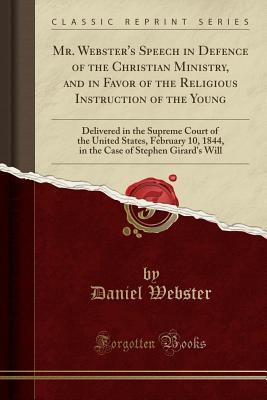Excerpt from Mr. Webster's Speech in Defence of the Christian Ministry, and in Favor of the Religious Instruction of the Young: Delivered in the Supreme Court of the United States, February 10, 1844, in the Case of Stephen Girard's Will
Christianity, general Christianity, is, and always has been, a part of the com mon law of Pennsylvania; Christianity, without the spiritual artillery of European countries for this Christianity was one of, the considerations. Of the royal charter. And the ve1y basispf its great founder, William, Penn; not Christianity founded on any particular religious tenets; not Christianity with an established church; 'and tithes, and spiritual courts; but Christianity'with liberty of conscience to all men. Wil liam Penn and Lord Baltimore were the first 'legislators who passed laws in favor of liberty of conscience: for before that period the principle of liberty of conscience appeared m the laws of no people, the axiom of no government, the institutes of no society, and scarcely in the temper of 'any man. Even the reformers were ms furious against contumacious errors as they were loud in asserting the liberty of conscience. And to the wilds of America, peopled by a stock' cut offby pereceu tion from a Christian society, 'does Christianity owe true freedom of religious hpiu ion, and religious worship.
About the Publisher
Forgotten Books publishes hundreds of thousands of rare and classic books. Find more at www.forgottenbooks.comwww.forgottenbooks.com
This book is a reproduction of an important historical work. Forgotten Books uses state-of-the-art technology to digitally reconstruct the work, preserving the original format whilst repairing imperfections present in the aged copy. In rare cases, an imperfection in the original, such as a blemish or missing page, may be replicated in our edition. We do, however, repair the vast majority of imperfections successfully; any imperfections that remain are intentionally left to preserve the state of such historical works.
Christianity, general Christianity, is, and always has been, a part of the com mon law of Pennsylvania; Christianity, without the spiritual artillery of European countries for this Christianity was one of, the considerations. Of the royal charter. And the ve1y basispf its great founder, William, Penn; not Christianity founded on any particular religious tenets; not Christianity with an established church; 'and tithes, and spiritual courts; but Christianity'with liberty of conscience to all men. Wil liam Penn and Lord Baltimore were the first 'legislators who passed laws in favor of liberty of conscience: for before that period the principle of liberty of conscience appeared m the laws of no people, the axiom of no government, the institutes of no society, and scarcely in the temper of 'any man. Even the reformers were ms furious against contumacious errors as they were loud in asserting the liberty of conscience. And to the wilds of America, peopled by a stock' cut offby pereceu tion from a Christian society, 'does Christianity owe true freedom of religious hpiu ion, and religious worship.
About the Publisher
Forgotten Books publishes hundreds of thousands of rare and classic books. Find more at www.forgottenbooks.comwww.forgottenbooks.com
This book is a reproduction of an important historical work. Forgotten Books uses state-of-the-art technology to digitally reconstruct the work, preserving the original format whilst repairing imperfections present in the aged copy. In rare cases, an imperfection in the original, such as a blemish or missing page, may be replicated in our edition. We do, however, repair the vast majority of imperfections successfully; any imperfections that remain are intentionally left to preserve the state of such historical works.
BUY NOW
Paperback, 68 pages
Published April 21st 2018 by Forgotten Books
© 2025 Bibleportal.com 版权所有.

Daniel Webster was a leading American statesman during the nation's Antebellum Period. He first rose to regional prominence through his defense of New England shipping interests. His increasingly nationalistic views and the effectiveness with which he articulated them led Webster to become one of the most famous orators and influential Whig leaders of the Second Party System.
Daniel Webster was an attorney, and served as legal counsel in several cases that established important constitutional precedents that bolstered the authority of the Federal government. As Secretary of State, he negotiated the Webster-Ashburton Treaty that established the definitive eastern border between the United States and Canada.
Webster tried three times to achieve the Presidency; all three bids failed, the final one in part because of his compromises. Similarly, Webster's efforts to steer the nation away from civil war toward a definite peace ultimately proved futile. Despite this, Webster came to be esteemed for these efforts and was officially named by the U.S. Senate in 1957 as one of its five most outstanding members.
... Show more